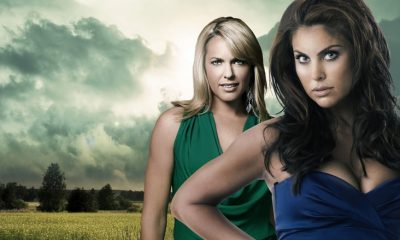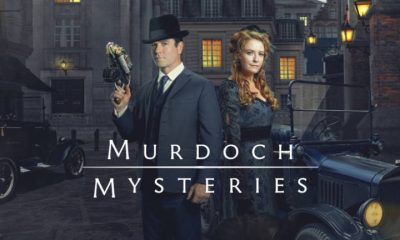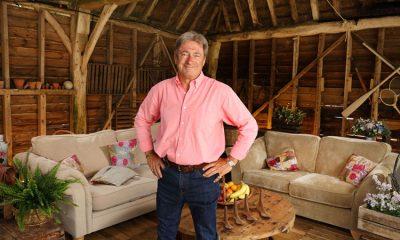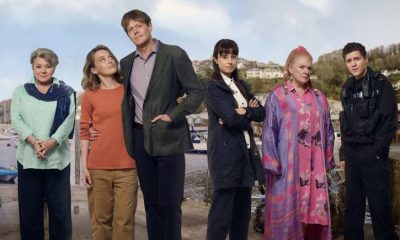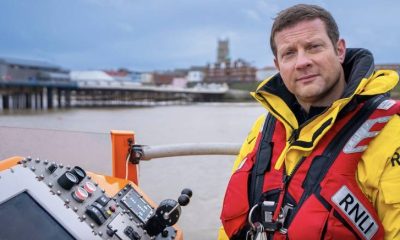Features
Ealing – The Biggest Little Studio in the World
There have been few famous film companies in the world whose headquarters could truthfully be described in these terms:
‘It somehow had the air of a family business, set on the village green of the queen of the London suburbs. The administrative block looked like a country cottage and was separated from the studios proper by a neat little rose garden, tended, between office crises.’
That was how Ealing Studios appeared in 1938 to Monja Danischewsky, appointed by the new head of production Michael Balcon to look after publicity. The country cottage which contained the administrative offices was Regency in style; behind it had once been apple orchards, ruefully cut down by Balcon’s predecessor Basil Dean to make space for the studios themselves. Yet even without the apple trees the Ealing environment made other British studios, not to mention Hollywood’s factories, look like dark satanic mills.
Behind Ealing’s unique appearance lay some special qualities. To the general public the other major studios in and around London – at Denham, Elstree, Shepherds Bush, Islington – were merely buildings where films were made. But Ealing was always much more than a geographical location. The word effortlessly conjures up an entire roster of performers and directors and a whole school of film-making. With a characteristic way of treating comedy, drama and all the gradations in between Ealing’s way with comedy caught the public attention – both in Britain and all over the world. Think of Ealing and one automatically thinks of comedy scenes: the car in The Lavender Hill Mob (1951) careering about the streets with Old MacDonald Had a Farm’ blaring out of its radio and a policeman on the running board singing along: Alee Guinness’ succession of d’Ascoynes meeting their fate in Kind Hearts and Coronets: the Scottish islanders in Whisky Calore! (both 1949) frenziedly concealing their favourite tipple from the excise officials’ prying eyes.
With such fond memories it is easy to forget that comedies made up only a small part of Ealing’s large output. Out of the 95 films Michael Balcon produced during nearly twenty years in control, the hard core of classic Ealing comedies only amount to nine. And Ealing had been established as an important production base seven years before Balcon arrived.
THE ATP YEARS
There had been some film activity near Ealing’s village green in the early silent days, but fully equipped studios were constructed only in 1931. Under the auspices of Associated Talking Pictures (ATP), Basil Dean, the theatrical producer-turned- film magnate, had supervised the construction of the studios which were the first in Britain to be custom-built for sound. At the time the Weather Bureau claimed that Ealing was the least fog-bound place in London; as Dean was particularly keen on outside filming the site suited him well.
Dean was the first theatrical personality to support the new talking pictures(the majority of his colleagues shrank from them in horror), yet for all his enthusiasm and his advocacy of location shooting, he remained closely tied to theatrical and literary traditions in his choice of subjects for filming. ATP produced well-groomed versions of plays such as Galsworthy’s Loyalties (1933), C.L. Anthony’s Autumn Croais (1934), J.B. Priestley’s Laburnum Grove (1936), along with versions of firmly established novels like The Water Gypsies (1932), Three Men in a Boat (1933), Lorna Doone (1934) and Midshipman Easy (1935). Many were directed by Dean himself.
In the mid-Thirties Dean tried to establish a repertory company of actors to stock both his film and stage productions. The scheme collapsed but some theatrical talent did move over permanently to the new medium: directors Carol Reed and Basil Dearden both emerged from Dean’s theatre staff. Ealing under Balcon had little to do with the eminently respectable kind of cinema Dean liked to promote, yet the two regimes still had many similarities and points of continuity. Both men were concerned to make the studio’s product characteristically British. The words of the plaque erected on the studio buildings in 1955 when they were sold to the BBC put the matter in a nutshell: ‘Here during a quarter of a century were made many films projecting Britain and the British character.’
Dean projected Britain largely through the pictorial image of the country. ATP’s films were not restricted to the fog-less fields around Ealing: The Water Gypsies took audiences on a tour of canals; Three Men in a Boat took them up and down the Thames; Sing As We Go (1934) one of the company’s Gracie Fields vehicles featured the bustling holiday crowds of Blackpool.
Balcon never neglected the country’s pictorial image either: Hue and Cry (1947), the film that ushered in the classic comedies, strikingly explored the blitzed landscapes of London. While one semi-documentary feature, Painted Boats (1945), was completely given over to canals. Yet his projection of Britain went considerably deeper than the details of urban and country landscapes. The best of Balcon’s films use national characteristics as a springboard for their very plots. Through their stories of community endeavours, of quirky individuals tilting at unwieldy officialdom we receive a clear picture of the imagined make up and habits of middle-class, mid-century England.
The Gracie Fields Effect
Another link between the two periods is the importance given to comedy. If ATP had made only genteel films of Galsworthy plays, they would have been out of business in no time. As it was, the company’s early years were financially shaky. They pulled through partly because of continuing financial support from the businessman Stephen Courtauld. and partly because of the box-office allure of Gracie Fields. Her first husband, Archie Pitt, positively shoved her into a film career with Sally in Our Alley (1931), but no-one regretted it. Provincial audiences lapped up the boisterous Lancashire comedy, sentiment and music in her films. When Dean became distressed by their lack of polish, he brought in a respectable name, J.B. Priestley, to work on the scripts.
Then, in 1935, another Northerner, George Formby, joined the studio for a series of equally popular farces – beginning with No Limit (1935) – that mixed slapstick and buffoonery with Formby’s suggestive ditties sung to a ukelele.
ATP Becomes Ealing
In 1938 many changes took place at Ealing. Balcon replaced Dean and the actual name of Associated Talking Pictures was phased out in favour of Ealing Studios, previously used as the name of the company who owned the studio space. By this time Gracie Fields had been lured to Hollywood with the offer of a higher salary, but the production of Formby films continued until 1941.
The popular tradition of low-brow, low-budget moneymakers was then taken over by Will Hay, who had worked for Balcon at Gaumont-British and transferred his activities to Ealing from 1941 until 1943, when ill-health curtailed his career.
With the end of the war, however, Ealing’s conception of comedy changed decisively. Instead of producing films shaped round comic stars with permanently established personalities, Balcon started to make films designed for a motley collection of versatile performers superbly adept at comedy: Alastair Sim, Alec Guinness, Margaret Rutherford, Joan Greenwood and Cecil Parker. Ealing comedies were now created by a team for a team.
In a way, this development was in line with another Ealing tradition that went back to Basil Dean’s days – the cultivation of a family atmosphere at the studio. The air of a ‘family business’ which Danischewsky found in 1938 had been carefully fostered from the start. To avoid any hint of drab regimentation, Dean called the studio canteen ‘The Inn’ and decorated its walls bright red to keep everyone happy. Ealing personnel also found happiness at the local pub, the Red Lion. The sense of being pioneers in difficult times helped spread cameraderie amongst Dean’s staff, and the studio’s chief star Gracie Fields was highly adept at jollying people along.
Balcon continued and intensitied Dean’s tradition of benevolent paternalism. Signs with legends like ‘The studio with team spirit’ hung from the walls. Balcon was also careful to encourage the individual talent within his team. Future producers and directors began as editors (Robert Hamer, Charles Crichton), assistant editors (Seth Holt), writers (Alexander Mackendrick), art directors (Michael Relph). Danischewsky himself rose from publicist to writer and associate producer.
The studio, in fact. became exactly the kind of isolated community it loved to celebrate in its films. It was populated by a closely-knit group of talent all proudly united in a common goal and somewhat suspicious of outsiders or anyone ‘different’. Once established at Ealing, people tended to stay there. Certainly those who moved away, such as Henry Cornelius and Alexander Mackendrick. were very much the exceptions.
Balcon’s team was drawn together during the war years, when, in common with British films of the period. Ealing’s output testified to a new strength, character and sense of purpose. Convoy (1941) was a sturdy drama of life on board a convoy ship. It’s publicity slogan was ‘Entertainment with authenticity’. But at this early stage of the war the authenticity in Convoy lay chiefly in its location footage. The director Pen Tennyson (killed in an air crash the following year) shot so much background material on the high seas that subsequent Ealing directors constantly returned to his footage to fill out their own maritime features and shorts. The attitudes of Tennyson’s characters were, however, less authentic: the officer class paraded on deck with binoculars while the humble workers stoked the tires and checked the gauges down below – both social groups carefully keeping each other at a respectful distance.
But the pull of the war’s events and the influx of documentary-trained talent, like the director Harry Watt, helped Ealing films reflect Britain’s new spirit of comradeship. All layers of society working together with courage and good humour. By the time of San Demetrio, London (1943), authenticity of emotional content was plainly considered more important than authenticity of location.
With the war drawing to a close, Ealing prepared for peacetime production. A deal with J. Arthur Rank’s empire in 1944 gave the company security for the future and a guaranteed release in Rank’s cinema chain for all their films. But what kind of films would these be? Balcon made an extravagant statement about this in the trade magazine Kinematograph Weekly in January 1945:
‘British films must present to the world a picture of Britain as a leader in Social Reform, in the defeat of social injustices and a champion of civil liberties … Britain as a questing explorer, adventurer and trader … Britain as a mighty military power standing alone and undaunted against terrifying aggression.’
One could just about squeeze Scott of the Antarctic (1948) into that scheme, but it hardly accounts for Ealing’s anthology of supernatural stories Dead of Night (1945), the rural romance of The Loves of Joanna Godden (1947) or the rush of comedies that followed in the post-war period.
It is not in the British character, despite Balcon’s declaration in 1945, to use films to confront big issues and to conquer all and sundry. Ealing realized this and instead settled for small issues, small communities and characters too humble to stride anywhere, except in their dreams.
In comedies and dramas, Ealing kept the community spirit of the war still burning brightly: London’s East End was featured in It Always Rains on Sunday (1947), Paddington Green in The Blue Lamp (1950). Other films looked at a cross-section of society: the varied frequenters of a London dance hall in Dance Hall (1950), a group of seamen on weekend leave in Pool of London (1951).
The Ealing Comedy Arrives
This was unquestionably Ealing’s richest period. The famous comedies emerged, three of them in 1949 (Passport to Pimlico, Whisky Calore! and Kind Hearts and Coronets), all subtly different in tone. Robert Hamer’s Kind Hearts and Coronets, in which Dennis Price undertook the disposal of the d’Ascoyne family, was distinguished by its black humour, highly literate script and an elegant visual precision unique in Ealing’s output. Alexander Mackendrick’s Whisky Calore! provided a caustic look at human foibles as Hebridean islanders and a pompous British resident (played by Basil Radford) clashed over a consignment of whisky rescued from a wrecked boat. Henry Cornelius’ Passport to Pimlico, witb a script by the Ealing stalwart T.E.B. Clarke presented a boisterous picture of another community eager to abandon constraints and which establishcd the London district of Pimlico as an independent, ration-free state after a dusty document revealed the área to be an outpost of the Duchy of Burgundy.
Ealing’s dramas of the period, like The Blue Lamp, also celebrated community life, although the population and officialdom were now seen working together to combat the anti-social elements that threatened its smooth running. Jack Warner played P.C. Dixon. a personification ofthe British bobby – cheerful, homely, fond of his darts and his garden plants. When he is fatally wounded during a bungled robbery, even the underworld fraternity unite with the authorities to trap the killer (played by Dirk Bogarde) amongst the happy crowds at a greyhound stadium.
As the Fifties moved on, however, Ealing’s projection of British Life began to falter. Comedies and dramas repeated the familiar formulas with diminishing returns. Comedies became increasingly pallid with The Titfield Thunderbolt (1953) and The Maggie (1954), and reached the height of whimsicality in Barnacle Bill (1957) when a sea captain, played by Alee Guinness, kitted out a rundown pier as an ocean liner. At least The Ladykillers (1955), where Mackendrick and his writer William Rose made a virtue of Ealing’s obsession with the quaint and decrepit, was fully up to standard. The Ealing dramas turned equally limp: Dunkirk (1958) presented all the emotions and situations of the past war in a manner so cold that they instantly congealed into clichés.
After Ealing’s home territory was sold to the BBC in 1955, production continued at MGM’s Borehamwood studios. Their final film was The Siege of Pinchgut, released in August 1959. The company may have run out of steam during the Fifties, yet its influence was still widespread. The output of Group Three, a company supported by a large government subsidy, chiefly consisted of meek little comedies in a debased Ealing manner, celebrating quaint happenings in quaint places. Many of Ealing’s talents migrated to television but the mature, vintage Ealing films of the Forties and early Fifties remain unique.
-

 News1 day ago
News1 day agoClaim Your Cash? Britain’s Hidden Fortune – Tonight, 18 April 2024, ITV1
-

 News2 days ago
News2 days agoInterrogation Raw, April 18, 2024, A&E, “Massacre in Maine”
-

 News2 days ago
News2 days agoJeopardy! Recap, Winner and Today’s Final Answer Wednesday, April 17, 2024
-

 News3 days ago
News3 days agoThe View, April 17, 2024, ABC, “A Different World Special”






